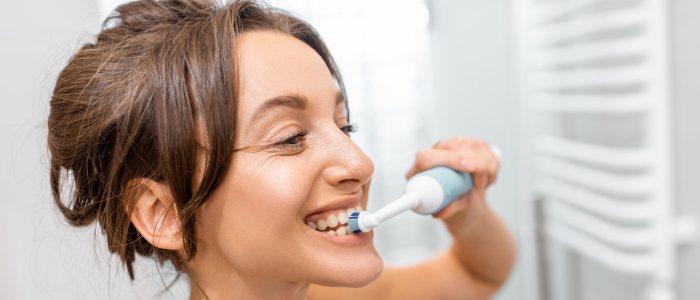The Pros and Cons of Electric Toothbrushes

The debate over manual versus electric toothbrushes has been ongoing in the world of dentistry for years. With advancements in technology, electric toothbrushes have gained popularity among oral care enthusiasts. But are they really worth the investment? In this comprehensive guide, we’ll explore the pros and cons of electric toothbrushes to help you make an informed decision about your oral hygiene routine.
Pros of Electric Toothbrushes
1.Efficient Cleaning: One of the most significant advantages of electric toothbrushes is their ability to provide efficient and consistent cleaning. The rapid oscillating or vibrating bristle movements can remove plaque and food particles more effectively than manual brushing, reducing the risk of cavities and gum disease.
2.Built-in Timers: Many electric toothbrushes come with built-in timers or interval features that encourage you to brush for the recommended two minutes. This ensures that you brush for an adequate duration, which is often overlooked during manual brushing.
3.Ease of Use: Electric toothbrushes are generally easier to use, making them an excellent option for individuals with limited dexterity or mobility issues, such as arthritis. The bristles do most of the work, requiring less effort from the user.
4.Pressure Sensors: Some electric toothbrushes are equipped with pressure sensors that alert you if you’re brushing too forcefully. This helps prevent gum damage, recession, and enamel erosion caused by aggressive brushing.
5.Multiple Brushing Modes: Many electric toothbrush models offer various brushing modes, such as sensitive, whitening, and gum care. This versatility allows you to customize your brushing experience to address specific dental concerns.
6.Smart Features: Some advanced electric toothbrushes are equipped with Bluetooth connectivity and smartphone apps that track your brushing habits. This can help you monitor your oral hygiene routine and receive personalized feedback from your dentist.
7.Effective Plaque Removal: Studies have shown that electric toothbrushes, when used correctly, can remove more plaque and reduce gum inflammation better than manual brushes.
Cons of Electric Toothbrushes
1.Initial Cost: One of the primary drawbacks of electric toothbrushes is their upfront cost. High-quality electric toothbrushes can be significantly more expensive than manual brushes. However, they often come with additional features and replaceable brush heads.
2.Battery Dependency: Electric toothbrushes rely on batteries or rechargeable batteries. If the battery runs out or the toothbrush malfunctions, you may need to replace the entire unit or go without it until repairs are made.
3.Bulkier Design: Electric toothbrushes can be bulkier and less portable than manual brushes. They can be less convenient for travelers or those with limited storage space in their bathrooms.
4.Learning Curve: Some users may find it challenging to adapt to the vibrations and movements of electric toothbrushes. It may take time to get accustomed to the sensation and learn the correct brushing technique.
Which Is Right for You?
The choice between a manual and an electric toothbrush ultimately depends on your personal preferences, needs, and budget. Here are some factors to consider:
– Oral Health Needs: If you have specific dental issues, such as gum disease or difficulty reaching certain areas of your mouth, an electric toothbrush may be more beneficial.
– Budget: Determine how much you are willing to invest in your oral care routine. While electric toothbrushes have a higher initial cost, they can offer long-term benefits.
– Ease of Use: Consider your dexterity and comfort level with different brushing techniques. If you have limited mobility or find manual brushing challenging, an electric toothbrush might be the better choice.
Electric toothbrushes have several advantages, including efficient cleaning, built-in timers, and ease of use. However, they also come with some drawbacks, such as an initial cost and the need for maintenance. Ultimately, the choice between a manual and an electric toothbrush should be based on your individual needs and preferences.
Regardless of the type of toothbrush you choose, the most crucial factor is maintaining a consistent and thorough oral hygiene routine. Brushing for two minutes, twice a day, along with daily flossing and regular dental check-ups, is key to achieving and maintaining optimal oral health. Consult with your dentist to determine the best oral care routine for your specific needs, whether it involves a manual or electric toothbrush.
For more information or to request an appointment, please click here or call our office at 856-343-4020.
